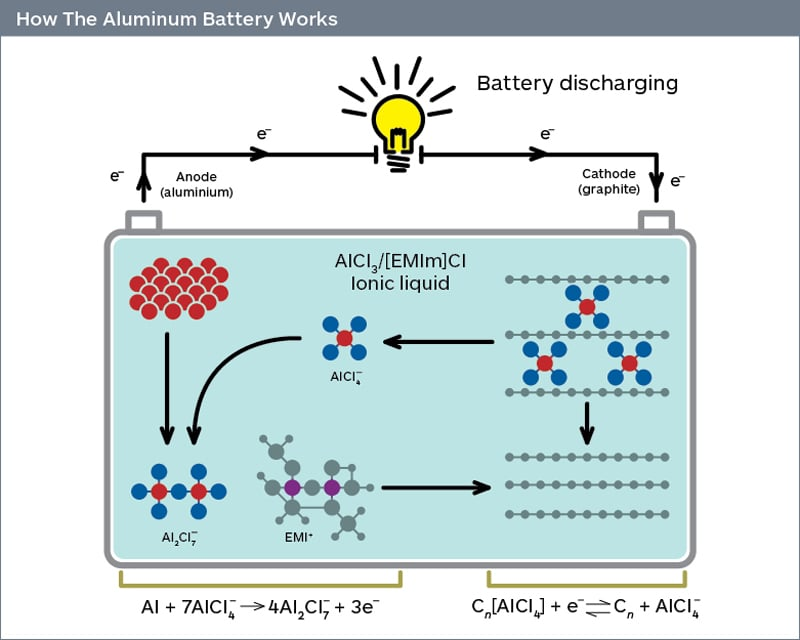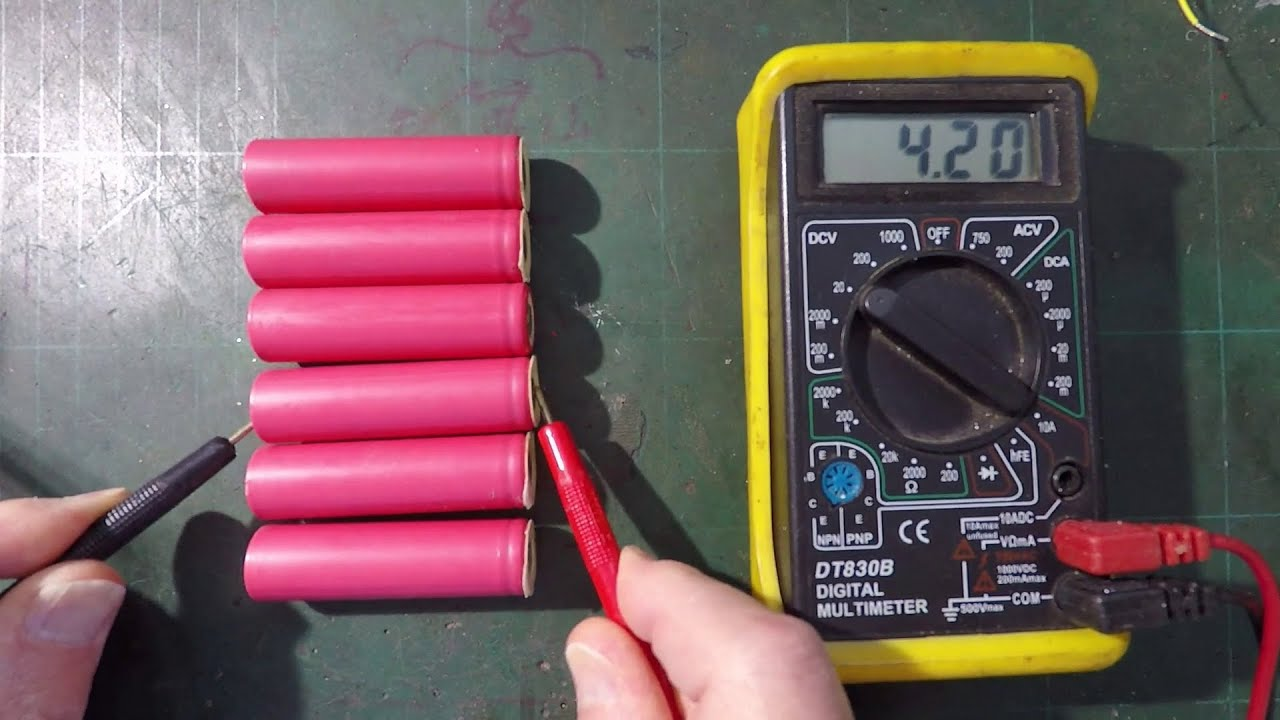Aluminium-ion batteries are emerging as a promising alternative to conventional lithium-ion technologies in the rechargeable battery landscape. These innovative battery chemistries are garnering attention due to their potential for high energy density and superior longevity compared to lithium-ion alternatives. Recent breakthroughs in the use of solid-state electrolytes and improved cycling endurance position aluminium-ion batteries as a competitive option for various applications. Notably, advancements in charge cycle performance, sustainability, and recyclability highlight the viability of these batteries in future energy storage solutions. As researchers continue to refine the technology, aluminium-ion batteries may soon revolutionize the market by delivering unmatched efficiency and environmental benefits.
Within the realm of advanced energy storage, aluminium-ion cells represent a cutting-edge approach, attracting interest as a viable substitute for traditional lithium-ion systems. These next-generation rechargeable power sources leverage innovative battery chemistries that promise significant enhancements in energy retention and efficiency. By overcoming previous obstacles related to electrolyte stability, researchers are paving the way for aluminium-based systems that can compete effectively with their lithium counterparts. The integration of solid-state materials not only bolsters performance but also opens avenues for sustainable recycling practices. As the development of these rechargeable batteries progresses, they stand to redefine standards within high energy density battery technologies.
The Rise of Aluminium-Ion Batteries as a Viable Alternative
Aluminium-ion batteries are emerging as a promising alternative to traditional lithium-ion batteries, primarily due to their potential to deliver higher energy density and longer lifespan. Recent advancements have showcased their ability to compete directly with established battery chemistries, especially in applications requiring significant energy storage without the drawbacks seen in lithium-based systems. As research continues, the focus on enhancing the structural integrity of aluminium-ion designs is proving critical in making these batteries more commercially viable.
One key innovation leading this charge is the development of solid-state electrolytes. These materials not only improve the safety and performance of aluminium-ion batteries but also facilitate better ionic conductivity. The integration of aluminium fluoride (AlF3) as a structural component underscores the shift towards incorporating more effective solid-state options in battery design, offering advantages over the liquid electrolytes commonly used in lithium-ion systems.
Understanding Battery Chemistries: From Lithium-Ion to Aluminium-Ion
Exploring the landscape of battery chemistries reveals a range of options beyond the conventional lithium-ion and lithium-polymer batteries. Key terms such as high energy density and recyclable materials have taken center stage as consumers and industries alike demand more sustainable solutions. With the introduction of aluminium-ion technology, the battery market is set for transformative changes that could redefine energy storage capabilities.
Sustainability is a pressing concern in the development of new battery technologies. The aluminium-ion system, with its impressive recyclability claim of over 80% recovery of its components, positions itself as a more environmentally friendly alternative to lithium-ion batteries. As the demand for rechargeable batteries increases, the push for greener battery chemistries aligns perfectly with the capabilities that aluminium-ion batteries can offer.
The Role of Solid-State Electrolytes in Advanced Battery Technologies
Solid-state electrolytes are crucial in enhancing the performance of modern batteries, including aluminium-ion systems. These electrolytes provide a stable interface between electrodes, reducing the risks of dendrite formation and enhancing overall battery safety. By optimizing the chemical composition, as seen in the recent studies using F-SSAF, researchers aim to unlock higher performance metrics, such as improved charge cycle endurance beyond existing lithium-ion configurations.
As battery technologies evolve, we see increasing interest in solid-state solutions that promise significant advantages over traditional liquid electrolytes. These solid-state electrolytes contribute to a reduction in weight, improved cycling performance, and enhanced safety, making them the focal point of research in high energy density batteries. Their application in aluminium-ion batteries could revolutionize the way we harness energy for various sectors, from consumer electronics to electric vehicles.
Comparing Performance: Aluminium-Ion vs. Lithium-Ion Batteries
When comparing aluminium-ion batteries to their lithium-ion counterparts, several performance metrics warrant attention. Aluminium-ion batteries have shown promise with longer lifespan capabilities, supporting over 10,000 charge cycles with minimal degradation. In contrast, lithium-ion batteries typically offer fewer cycles before performance deteriorates, which raises concerns around their sustainability in long-term applications.
Moreover, the energy density potential of aluminium-ion batteries could outstrip that of lithium systems, presenting a significant competitive edge. As innovations continue to shape their feasibility, aluminium-ion batteries could carve out a niche in high energy applications where both longevity and performance matter. The willingness of researchers to tackle historical issues with electrolytes presents a pathway for aluminium-ion batteries to challenge the lithium dominance effectively.
The Eco-Friendly Advantages of Aluminium-Ion Batteries
The ecological footprint of battery technology is a growing concern as demand for energy storage continues to rise. Aluminium-ion batteries offer an environmentally sound alternative, particularly due to their high recyclability rate. Recovering more than 80% of the battery material during recycling minimizes wastage and enhances sustainability—an aspect that’s becoming vital as the world grapples with climate change issues.
Furthermore, the abundant availability of aluminium compared to lithium positions aluminium-ion batteries as a resource-efficient energy solution. This shift not only lowers the resource extraction burden on the environment but also promotes a circular economy in battery production. As manufacturers and consumers prioritize eco-friendly options, aluminium-ion technology could find a welcoming space in the market, aligning with global sustainability goals.
Innovative Recycling Solutions for Aluminium-Ion Batteries
Aluminium-ion batteries stand out for their innovative recycling solutions, which are integral for sustainability. The ability to recover over 80% of materials such as AlF3 presents not only economic benefits but also significant environmental advantages. This means that as the adoption of aluminium-ion batteries grows, the potential for a circular economy in battery technology becomes increasingly feasible.
Current recycling processes enable efficient refurbishment of aluminium-ion components, making it a vital aspect of responsible battery production. By reducing waste and maximizing material reuse, the ecological impact of battery production can be greatly decreased. Such advancements ensure that as we transition towards more sustainable energy solutions, aluminium-ion batteries can play a leading role in the battery landscape.
Challenges Facing Aluminium-Ion Battery Adoption
While aluminium-ion batteries exhibit impressive characteristics, transitioning from research to widespread adoption involves overcoming significant challenges. The historic issues with electrolyte interface stability remain a central concern, wherein the performance may suffer if not appropriately addressed. Researchers continue to explore robust solutions that can mitigate these risks, making further advancements crucial for commercial viability.
Moreover, scaling production levels to meet the increasing demand presents logistical hurdles. The manufacturing infrastructure for aluminium-ion systems must evolve to ensure efficiency and meet performance standards comparable to lithium-ion systems. Overcoming these challenges will determine the timeline for aluminium-ion batteries entering the mainstream market, highlighting the importance of ongoing research and development.
Future Prospects for Aluminium-Ion and Other Battery Technologies
The future of energy storage is bright, particularly with the integration of aluminium-ion batteries coupled with advancements in alternative rechargeable battery technologies. As various chemistries are explored, the market may witness a diversification of battery solutions tailored to specific applications, from consumer electronics to larger energy systems.
Ongoing development in areas including solid-state electrolytes and novel materials promises enhanced performance capabilities across the board. Emerging trends suggest we may see hybrid solutions that combine the strengths of multiple battery chemistries, driving efficiency and sustainability in energy storage that was previously unattainable with solely lithium-based models.
The Importance of Research and Innovation in Battery Technology
Continued research and innovation are paramount in propelling battery technologies to new heights. Universities, companies, and research institutions worldwide are investing significant resources into understanding deeper battery chemistries and the mechanics of energy storage. By fostering collaborative efforts, breakthroughs in materials such as solid-state electrolytes and effective recycling methods can be rapidly developed.
It is through innovation that we can hope to tackle existing technological barriers. The development of aluminium-ion batteries is a testament to this, showcasing the potential for new materials to redefine performance standards. In the competitive landscape of battery technologies, staying at the forefront of research will be crucial in delivering high-performing, sustainable energy solutions for the future.
Frequently Asked Questions
What are aluminium-ion batteries and how do they compare to lithium-ion alternatives?
Aluminium-ion batteries (Al-ion batteries) are a type of rechargeable battery chemistry that utilize aluminum as the main electrode material. Compared to lithium-ion alternatives, Al-ion batteries are believed to offer higher energy density, longer cycle life, and enhanced recyclability. Recent advancements have shown promise in addressing previous limitations, especially with the development of a solid-state electrolyte that facilitates better performance and durability.
What are the advantages of using aluminium-ion batteries?
Aluminium-ion batteries provide several advantages over traditional lithium-ion batteries, including a theoretically higher energy density, superior recharge cycles, and excellent recyclability. Research indicates that Al-ion batteries can endure more than 10,000 charge cycles with minimal degradation, making them a compelling candidate for future high energy density battery applications.
How does the solid-state electrolyte improve aluminium-ion battery performance?
The introduction of a solid-state electrolyte in aluminium-ion batteries significantly enhances their performance by creating a stable interface between the aluminium and carbon electrodes. This advancement addresses previous challenges related to electrolyte performance and durability, allowing for improved cycle endurance and efficiency, surpassing the endurance of some lithium-iron phosphate (LiFePO4) batteries.
Are aluminium-ion batteries viable for commercialization?
Recent research indicates that aluminium-ion batteries are progressing towards commercialization. Key developments, such as the effective solid-state electrolyte derived from aluminum fluoride (AlF3) and new interface solutions, have addressed prior performance challenges. As studies continue to explore other electrolyte frameworks, the potential for Al-ion batteries to replace lithium-ion batteries is becoming increasingly viable.
What recycling benefits do aluminium-ion batteries offer?
Aluminium-ion batteries exhibit promising recycling advantages, particularly with the recovery of over 80% of aluminium fluoride (AlF3) during the recycling process. This high recyclability not only reduces waste but also adds to the sustainability appeal of Al-ion chemistry as a competitive alternative to conventional lithium-ion batteries.
Can aluminium-ion batteries achieve high energy density?
Yes, aluminium-ion batteries have the theoretical potential to achieve high energy density, outperforming many existing lithium-ion alternatives. Recent research has taken steps toward realizing this potential by enhancing electrolyte formulations and electrode interfaces, thereby making it possible for Al-ion technologies to deliver competitive energy performance in future rechargeable battery markets.
| Key Point | Details |
|---|---|
| Dominance of Lithium-ion Batteries | Lithium-ion and Li-Po batteries dominate the market due to their high energy density and good recharge cycles. |
| Emerging Aluminium-ion Batteries | Recent Chinese research suggests Al-ion batteries may overcome challenges faced by prior technologies, posing a competitive alternative. |
| Solid-state Electrolyte Development | The use of a solid-state electrolyte (F-SSAF) has been achieved, improving interface reliability between electrodes. |
| High Cycle Endurance | Prototype cells can endure up to 10,000 cycles with minimal degradation. |
| Recyclability Potential | Over 80% recovery of AlF3 during recycling shows promising results for sustainability. |
| Future Research Directions | Further exploration of frameworks beyond AlF3 is necessary for the advancement of Al-ion batteries. |
Summary
Aluminium-ion batteries present a promising advancement in battery technology, offering potential advantages over traditional lithium-ion systems. By utilizing a solid-state electrolyte that enhances charge cycle endurance and featuring excellent recyclability, Al-ion batteries may soon provide a competitive alternative in the rechargeable battery market. As researchers continue to explore new frameworks and improvements, Aluminium-ion batteries are paving the way for a more sustainable and efficient future in energy storage.



